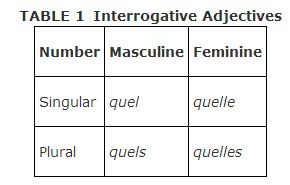Use interrogative adjectives, adverbs, and pronouns to ask for information.
The interrogative adjective quel (which?, what?), shown in Table , agrees in number and gender with the noun it modifies.

Quel may be followed by est‐ce que or inversion:
- Quelle chemise est‐ce que tu préfères? (Which shirt do you prefer?)
- Quelle chemise préfères‐tu? (Which shirt do you prefer?)
In colloquial French, quel + a noun may be placed at the end of the phrase to form the question: Tu préfères quelle chemise? (Which shirt do you prefer?)
Quel may also be preceded by a preposition:
- De quelle chemise est‐ce que tu parles? (Which shirt are you talking about?)
- De quelle chemise parles‐tu? (Which shirt are you talking about?)
Être is the only verb that may separate quel from its noun:
- Quel est ton nom? (What's your name?)
- Quelle est la date? (What's the date?)
Interrogative adverbs
The following interrogative adverbs can be used with est‐ce que or inversion to ask questions.
- comment (how?)
- combien (how much/many?)
- quand (when?)
- où (where?)
- d'où (from where?)
- pourquoi (why?)
In colloquial spoken French, they are often placed after the verb, as follows:
- Tu t'appelles comment? (What's your name?)
- Les invités arrivent quand? (When are the guests arriving?)
With combien, comment, où, d'où, and quand (but not with pourquoi), a question may be formed by inverting a noun subject with a verb that has no object:
- Où habite cette famille? (Where does that family live?)
- Combien coûte ce CD? (How much does this CD cost?)
Invariable interrogative pronouns
Invariable interrogative pronouns (which do not change), illustrated in Table 2, have only one form. No agreement is necessary.
Note that the i from qui is never dropped, whereas que becomes qu' before a vowel or vowel sound:
Invariable interrogative pronouns are used in the following ways:
As subjects, followed by verbs in the third person singular
- Qui (Qui est‐ce qui) est tombé? (Who fell?)
- Qu'est‐ce qui est tombé? (What fell?)
(Qui is the short form and qu'est‐ce qui is the long form. Either is acceptable.)
As objects of the verb
- Qui est‐ce que tu cherches? (Whom are you looking for?)
- Qui cherches‐tu? (Whom are you looking for?)
- Tu cherches qui? (Whom are you looking for?)
- Qu'est‐ce que tu cherches? (What are you looking for?)
- Que cherches‐tu? (What are you looking for?)
- Tu cherches quoi? (What are you looking for?)
Note that que becomes quoi after a verb. With que, when the subject is a noun, inversion is not performed: Que cherche Sylvie? (What is Sylvia looking for?)
As objects of a preposition
Use a preposition + qui for people; use a preposition + quoi for things.
- À qui est‐ce que tu parles? (To whom are you speaking?)
- À qui parles‐tu? (To whom are you speaking?)
- Tu parles à qui? (To whom are you speaking?)
- De quoi est‐ce que tu parles? (What are you talking about?)
- De quoi parles‐tu? (What are you talking about?)
- Tu parles de quoi? (What are you talking about?)
À qui shows possession: À qui est ce livre? (Whose book is this?)
De qui shows relationship: De qui es‐tu le frère? (Whose brother are you?)
Variable interrogative pronouns
Variable interrogative pronouns agree in number and gender with the nouns they replace. Select the singular form of the interrogative pronoun to express “which one” and the plural to express “which ones.”
- Laquelle de ces voitures aimes‐tu? (Which one of these cars do you like?)
- Lesquels de ces films as‐tu vus? (Which ones of these films have you seen?)
- À laquelle de tes amies écris‐tu? (To which one of your friends are you writing?)
- Desquels de ces papiers avez‐vous besoin? (Which ones of these papers do you need?)
Use contractions with the prepositions à (to) and de (of, from) as shown in Table 3:
Il y a
Il y a (there is/are or is/are there?) can ask or answer a question, as follows: